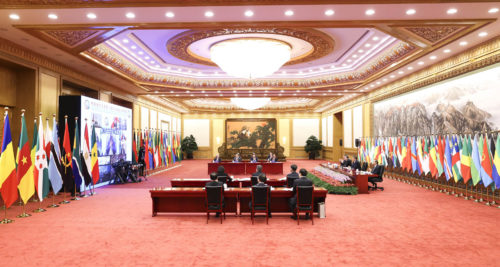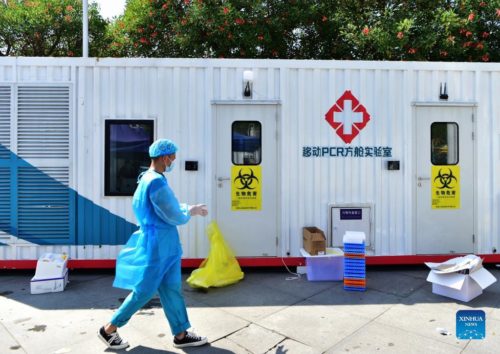Yet another vaccine scandal punctures public trust in safety

Over the weekend, a scandal over reports that Changchun Changsheng, a vaccine producer in northeastern China’s Jilin Province, had produced and sold hundreds of thousands of substandard vaccines devolved into nationwide outrage. The initial reports of trouble brewing happened a few days earlier:
- On July 15, Changchun Changsheng was first told to stop production of a rabies vaccine, according to a notice posted by the State Food and Drug Administration (in Chinese). The notice simply mentioned that “fabricated records and other grave violations” (记录造假等严重违反 jìlù zàojiǎ děng yánzhòng wéifǎn) had been found. The report attracted some attention, but it was not a crisis yet.
- Then on July 19, a nine-month investigation concluded that over 250,000 substandard DPT vaccines (diphtheria, pertussis, and tetanus; pertussis is more commonly known as whooping cough) had been produced and sold by the company to the Center for Disease Control and Prevention in eastern China’s Shandong Province, according to the Jilin Food and Drug Administration (in Chinese).
- Panic spread on July 21, after a viral WeChat article excoriated Changchun Changsheng for its business practices, and reminded readers ominously, “These vaccines they produced are being injected into you and your kids every day.” Sixth Tone says that the article “pointed out that the same powerful individuals who run Changchun Changsheng are also responsible, through their ownership of other companies, for producing a large proportion of the most widely used vaccines in China, including those for hepatitis B, chicken pox, and influenza,” and that it had been “viewed over 100,000 times, the maximum number displayed by WeChat” before it was censored.
- You can read that WeChat article, titled “Vaccine king” (疫苗之王 yìmiáo zhī wáng) and written by a blogger with the pen name Beast (兽爷 shòuyé), in a cached version (in Chinese). If you’re big on blockchain, TechNode reports that some savvy Etherium users inserted the article text into the metadata of a transaction, where it cannot be censored by Chinese authorities.
Chinese officials rush to reassure
- President Xi Jinping called the violations “serious and appalling,” the SCMP reports, and also urged severe punishment “to cure the chronic disease [of corruption] and scratch poison from one’s bones.”
- “This vaccine case has broken the moral bottom line” (此次疫苗事件突破人的道德底线 cǐcì yìmiáo shìjiàn tūpò rén de dàodé dǐxiàn), Premier Li Keqiang 李克强 said on July 22 (in Chinese).
- Premier Li Keqiang has launched an investigation, but the New York Times notes (paywall) that his is a familiar and disappointing face for many on this issue:
“One image circulating online showed a screenshot of a news item touting a promise from Premier Li Keqiang on Sunday to ‘resolutely crack down on all illegal and criminal acts that endanger the safety of people’s lives.’”
“Next to it was a similar statement that Mr. Li offered after another vaccine scandal in 2016, suggesting the government had done nothing to address the problem.”
- “Beijing does not have either of these two vaccines in question, the public can be at ease,” an unidentified official at the Center for Disease Control and Prevention in Beijing said, while regulators in Guangdong and Sichuan Province also felt compelled to reassure that the problematic vaccines were restricted to Shandong Province, AFP reports.
- Altogether, “eight provinces or cities immediately announced they would be stopping or suspending the use of human rabies vaccine from Changsheng, while another four claimed they had never used it,” CNN reported.
- State media called for transparency, with an editorial in the China Daily urging that “the government needs to act as soon as possible to let the public know it is resolved to address the issue and will punish any wrongdoers without mercy.” Meanwhile, the Global Times admitted in an op-ed that the government’s reluctance to shed light on the facts allowed “many readers” to side with “public outrage over vaccine manufacturers and suspicion toward the nation’s supervision department.”
- Lawmakers raised alarm in Hong Kong, which “urgently requires a policy to ensure local children receive necessary vaccines before an influx of mainlanders drives up demand in the coming months,” the South China Morning Post reports.
- “In Hong Kong, all vaccines for children are imported from foreign brands. Private clinics usually see about 20 percent of their patients come from across the border to avoid jabs made on the mainland,” a number that is “expected to soar in the coming one to two months,” the SCMP adds.
A series of safety failures
Though no injuries or deaths have been reported from Changsheng’s vaccines in this case, this is far from the first time a wide-scale vaccine scandal has erupted in China, nor is it the first time that the central government has vowed to eliminate substandard vaccines in an attempt to restore the public’s trust in the country’s medicine supplies. The promise, however, seems to be unfulfilled given the latest scandal.
- In 2010, the China Economic Times, a Beijing-based newspaper, reported that improperly stored vaccines administered by the Center for Disease Control and Prevention in Shanxi Province had killed four children and sickened more than 70 others who had been vaccinated between 2006 and 2008. Wang Keqing 王克勤, the investigative reporter who exposed the scandal, was forced to leave the publication under pressure from higher-ups.
- In 2013, “eight infants died in…two months following injections that were meant to immunize them against hepatitis B,” according to the New York Times (paywall).
- In 2016, a pharmacist in Shandong Province was caught peddling 25 kinds of unrefrigerated vaccines to medical facilities across 23 provinces and cities since 2010. Premier Li Keqiang ordered (in Chinese) central agencies to conduct a thorough investigation into the incident and pledged to improve the regulatory system.
- “In November 2017…at least another 400,000 doses of the same [DPT] vaccine, produced by a different, second company, the Wuhan Institute of Biological Products, were found to be substandard,” CNN notes.
And in China, the memory of public health crises goes far beyond just vaccines:
- “In 2008, six children died and 300,000 fell ill after drinking milk powder tainted with melamine, a case officials initially had covered up,” the Guardian notes.
- Some on social media compared milk powder with vaccines: Reuters quotes one commenter on Weibo, who said, “Yesterday it was milk powder, today vaccines. What will it be tomorrow?”
- “This Chinese vaccine scandal is becoming as big of a [crisis] as the milk powder incident a decade ago,” Bloomberg reporter Lulu Yilun Chen wrote on Twitter.
Blowback for China’s pharma industry
- Changchun Changsheng was fined 3,442,887 yuan ($507,843) for its data forgery and substandard vaccine production, which the Wall Street Journal says (paywall) breaks down into a $380,610 penalty and $126,683 worth of assets seized from sales of the vaccine.
- “Changsheng’s shares fell by the 10 percent daily limit to 13.05 yuan on Monday after trading was halted in the morning. It was the sixth straight day that the stock had fallen by that magnitude, erasing 11.2 billion yuan (US$1.65 billion) in value from its market capitalization,” the SCMP reports.
- Other companies were hit: “Chongqing Zhifei Biological Products, which makes vaccines for pneumonia and rabies, led declines among pharmaceutical stocks on Monday, dropping by its 10 percent daily limit to 44.10 yuan. Hualan Biological Engineering, which makes serum albumin and other biological products, plunged by 9.9 percent to 31.32 yuan,” the SCMP adds.
Rage on the Chinese internet
- The word vaccine (疫苗 yìmiáo) had over 320 million mentions on July 21, according to WeChat Index, an in-app feature that offers data on how many times a word has been used on the app within a certain period of time. In comparison, there were about 8 million mentions of trade war (贸易战 màoyìzhàn) on the same day.
- The relevant hashtag on social media platform Weibo had over 10 million views. The hashtag included the company’s name: #长春长生疫苗造假# “Changchun Changsheng fabricating vaccines.”
- “It’s terrifying to raise a child in China. I am afraid that one day my daughter will ask me: ‘Dad, why am I fed with baby formula like this? Why do I receive vaccines like this? Why do I breathe air like this? Why do I drink water like this? Why do I receive education like this,” one Weibo user commented (in Chinese).
- Another viral article on WeChat (link here in Chinese) is instructing people to make complaints against the State Drug Administration (SDA) amid the two-month-long government-backed campaign named “I give suggestions for the general inspection survey” (我为大督查提建议 wǒ wéi dà dū chá tí jiànyì). “Let’s report the SDA’s unsatisfying service to the State Council instead of just expressing anger and depression on your WeChat Moments,” the author wrote.
- What is the general inspection survey? Glad you asked — here’s an article on The China Project about it.
- A local procuratorate in Henan Province apologized on July 23 for making “inappropriate remarks” on the news using its official Weibo account. In a since-deleted post, the account shared an old Weibo post from SDA entitled “It’s unnecessary to trust imported vaccines blindly because China has already established a regulatory system covering all kinds of vaccines,” commenting, “Go f**k yourself.”
Additional research by Jiayun Feng.






